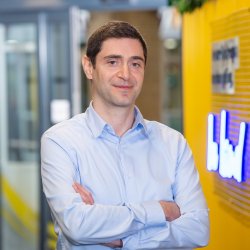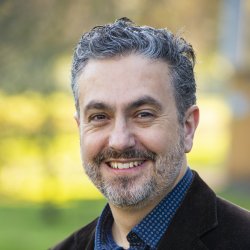Human and machine in harmony? Centre for Translation Studies (CTS) kick-start activities of Faculty-funded learning and teaching project to explore GenAI use by students
Teaching is a dynamic, context-sensitive process. Fully espousing the need for innovation, the Centre for Translation Studies has undertaken a major revamp of its postgraduate courses in the last two years. This entailed reimagining module content (and methods of assessment) with a focus on delivering a professionally relevant, skills-focused curriculum in a context of rapid technological change.
This philosophy is now put to the test within the remit of a Learning and Teaching Project Fund award https://www.surrey.ac.uk/faculty-arts-social-sciences/education/projects received by Dr Dimitris Asimakoulas, Prof. Constantin Orasan and Dr Felix do Carmo. The project, entitled “Translation in the era of generative artificial intelligence” addresses one of the most recent technological changes on everyone’s minds – and lips – especially those of translators. This is the advent of natural language generation with the use of Generative Artificial Intelligence/GenAI.

Through workshops and focus groups, the project team aim at examining, first, “student motivation for using large-language-model interfaces (ChatGPT-style interfaces, for example)”, second, “perceptions visa-a-vis machine assistants (customisation to own needs, general attitudes towards how this technology is evolving)” and third, “the values underpinning GenAI use (such as the search for creativity)”. Pre-translation, translation and editing phases of writing will thus be addressed. As the team also note, “in this project we do not distinguish between original writing and translation; indeed, many translation studies scholars see translation and creative writing (also technical writing and specialised translation) as interrelated modes of writing which entails priority-setting, iterative research, constant drafting and delivering a fit-for-purpose text characterised by originality.” Thus, in a first focus group of the project (on Friday 23 February), CTS students met to discuss creativity and their educational needs with respect to unlocking their creative skills in their MA course. Among the several topics discussed was the leveraging of natural language generation (machine output) when free-writing or writing within the constraints of a specific brief. Flexibility and critical thinking transpired as important values.
We look forward to the next phases of this initiative, which we feel coheres well with our overall teaching approach, an approach that is “both eclectic and reflective in that it is not tool-led or tool-focused as such” – given the speed with which technology evolves. Rather, we focus on training students to assess the quality, reliability and contextual understanding of technological solutions for translation projects. By forming student-staff partnerships for the next phases of the project, we hope to generate new ideas, to better understand how generative models like ChatGPT can be integrated into our current teaching and to create a space for enhancing digital capabilities of budding translators.


